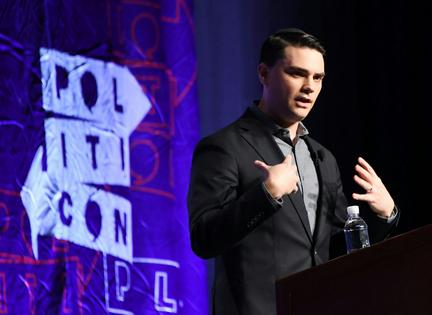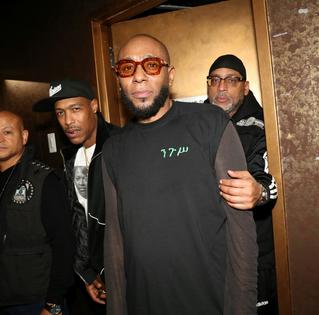Ben Shapiro’s hip-hop hypocrisy and white male grievance lands him on top of pop music charts for a brief moment
Published in Political News
Over the past decade, conservative commentator and podcaster Ben Shapiro has made a living telling his followers that rap isn’t music.
If anyone thinks so, Shapiro tweeted in 2012, “you’re stupid.”
Shapiro explained his reasoning during a 2019 interview:
“In my view, and in the view of my music theorist father who went to music school, there are three elements to music,” Shapiro said. “There is harmony, there is melody and there is rhythm. Rap only fulfills one of these, the rhythm section.”
As a result, Shapiro concluded, rap is “basically spoken rhythm.”
“It’s not actually a form of music,” he said. “It’s a form of rhythmic speaking.”
Leave it to Shapiro, then, to drop a “rhythmic speaking” song filled with white grievance during the early days of the 2024 U.S. presidential campaign.
Teaming up with Canadian rapper Tom MacDonald, Shapiro released “Facts” in January 2024. Given today’s bitter partisan divide and extremist culture wars, it comes as no surprise that Shapiro’s track quickly found a devoted following. But his racist, anti-rap rap lyrics ultimately repeat the same tired charges right-wing politicians have used against hip-hop since its birth over 50 years ago.
My father isn’t a music theorist. But as a scholar who earned a Ph.D. by writing a rap album and continues to release rap music about race and American society as my academic work, I knew a hit song filled with racist diatribes like “Facts” was bound to happen.
It’s not the first time blatant racism has propelled an artist to the top of music charts.
In July 2023, Jason Aldean, a white country singer, released a video for “Try That In A Small Town” that was criticized for promoting racial violence. That song shot up to No. 1.
In November 2023, a video of country singer Morgan Wallen, who is also white, surfaced and went viral. In the video, he is captured saying, “take care of this p— a– n—.” While Wallen was roundly condemned and apologized for his racist and sexist language, his music has also topped the charts.
But to simply call MacDonald and Shapiro’s “Facts” racist would be too quick a dismissal of all that is at play.
By performing over a popular-sounding trap-style beat, Shapiro and MacDonald might lead listeners to overlook their heavy reliance on Black vernacular speech, which toes the line between minstrelsy and abject cultural appropriation.
Because it’s delivered in the form of a conventional rap song, a listener might even be convinced that the racism and sexism the artists are performing are expectations, and Shapiro and McDonald are just doing what all rappers do.
It’s a clever gambit. It’s “rapwashing” racism so audiences don’t perceive the obvious intent.
Early in the song, MacDonald tries out a melodic delivery, rap-singing:
“This ain’t rap. This ain’t money, cars, and clothes. We won’t turn your sons into thugs or your daughters into h—.”
The song goes further:
“Claim that I’m racist. Yeah, alright. I’m not ashamed because I’m white. If every Caucasian’s a bigot, I guess every Muslim’s a terrorist. Every liberal is right.”
For a brief moment, during the last week of January, the song hit No. 1 on the iTunes U.S. chart, which gave Shapiro the audacity, and the apparent receipts, to call himself the “#1 rapper in America.”
It’s not surprising that such a large swath of music consumers would find “Facts” entertaining.
Eminem, a white rapper, might be a case study. In the early 2000s, he achieved great success in part because of the way he gave voice to the repressed rage of certain segments of “White America.”
But since the presidential election of Donald Trump in 2016, that rage felt all across white America has been politicized and commercialized to such a degree that I believe hip-hop listeners have heard enough of white grievance.
It also seems white artists like Eminem took notice.
In his 2017 BET Hip Hop Awards freestyle cypher, Eminem went to great lengths to distance himself from the actions of his fans who seemed to be politically aligned with Trump and the alt-right.
Eminem’s freestyle affected his popularity badly enough that he later backtracked his remarks and apologized to his Trump-loving fans on a song called “The Ringer” on his 2018 album “Kamikaze.”
From its start more than 50 years ago, hip-hop has never been singularly focused on mainstream measures of success such as Grammy nominations and awards, music industry chart rankings or sold-out concerts. Nor have its cultural practitioners and producers been gender or race exclusive.
In fact, before rap became an international multibillion dollar industry, early rappers were wary of the mainstream music industry, and many believed it would negatively affect the integrity of the music and culture.
But even early rappers were forced to find a complicated balance between culture and capitalism.
For instance, in the late 1990s, Yasiin Bey, formerly known as Mos Def, and Talib Kweli released their first album, “Mos Def & Talib Kweli Are Black Star.”
The critically acclaimed project was filled with lyrics focused on Black consciousness, the perils of mainstream hip-hop and a kind of Pan-Africanism.
Their label, Rawkus Records, was known for recording and signing several underground rap acts including Eminem, Pharoahe Monch and Common.
But Rawkus was just as much a part of the music industry as any other record label.
It was co-founded and financially backed by James Murdoch, a son of the media mogul Rupert Murdoch. The label was eventually bought by Murdoch’s News Corp.
Over the past five decades, rap music and hip-hop culture has come to mean a lot of different things to a lot of different people.
For Bey, though, the question goes beyond the money or popularity.
“Where’s the message that I can use?” he asked during a 2024 interview.
I would love to believe that racist, sexist, white male grievance rap isn’t where the zeitgeist is in America.
But Ben Shapiro and his conservative followers are betting that it is – at least for a brief moment.
This article is republished from The Conversation, a nonprofit, independent news organization bringing you facts and trustworthy analysis to help you make sense of our complex world. It was written by: A.D. Carson, University of Virginia
Read more:
Hip-hop professor looks to open doors with world’s first peer-reviewed rap album
After ‘Rapper’s Delight,’ hip-hop went global – its impact has been massive; so too efforts to keep it real
Hip hop and Pan Africanism: from Blitz the Ambassador to Beyoncé
A.D. Carson does not work for, consult, own shares in or receive funding from any company or organization that would benefit from this article, and has disclosed no relevant affiliations beyond their academic appointment.


































































Comments